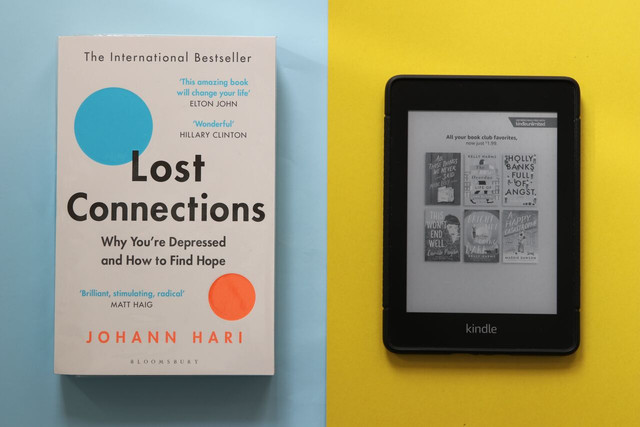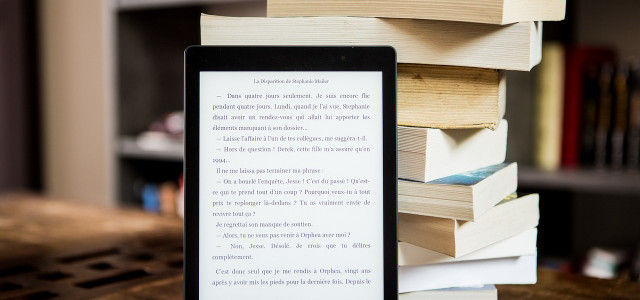If you're passionate about protecting the planet, choosing between paper books vs. eBooks is tricky. We've got the facts you need to make an eco-conscious choice.
Before we jump into the paper books vs. eBooks debate, did you know that eBooks weren’t just an overnight sensation? In fact, they were 40 years in the making. In 1971, Michael Hart started Project Gutenberg, an initiative aiming to make electronic versions of the world’s best literature available to anyone for free. But it wasn’t until the late 90s that digital devices like the Rocket eBook hit the market. The only problem? They were too bulky and impractical for everyday use.
Then, in 2007, Amazon changed everything with the release of the Kindle e-reader. Suddenly, eBooks were accessible and easy to read on a portable device. Within just five years of the Kindle’s release, eBook sales skyrocketed from less than 1 percent to a whopping 20 percent of the US trade book market.
But for all the hype around eBooks, many book lovers worried they would spell the end of paper books and charming, personal physical bookshops. Yet, in a surprising turn of events, eBook sales have plateaued in recent years while print books continue to thrive. Perhaps it’s because nothing quite beats the sensory experience of holding a physical book in your hands and turning the pages. Whatever the reason, it seems that eBooks and paper books have found a way to coexist.
Let’s take a look at paper books vs. Ebooks and the effect they have on the planet.
How Do eBooks Impact the Environment?

(Foto: CC0 Public Domain / Unsplash - bady abbas)
Are you on Team eBooks or Team Paper Books? If you’re trying to reduce your environmental impact, it can be tough to decide which option is best. After all, eBooks seem like a great choice because they don’t require trees to be cut down, but they come with their own set of environmental drawbacks. Let’s take a closer look at the advantages of eBooks first.
Advantages of eBooks:
- Saved trees. eBooks do not require trees to be cut down to produce them. Considering how much we need forests and their ecosystems, this is a weighty point.
- Reduced carbon footprint. eBooks also reduce the carbon footprint associated with book deliveries. When you order a physical book online, it has to travel hundreds of miles in planes and trucks before it gets to your doorstep. With eBooks, you can download them instantly without any transportation emissions.
- You can read them in dark settings. Want to stay up late reading without bothering your partner with the light? This is a definite point for backlighting in the paper books vs. ebooks debate.
- Adjustable settings and dictionaries. eBooks offer a number of accessibility options for people who have different eyesight requirements. And it’s always nice to be able to instantly look up the definition of a word without grabbing a computer or handheld dictionary.
Disadvantages of eBooks:
- Potentially supporting environmentally unfriendly companies. If you buy a Kindle, you are supporting Amazon, a company whose environmental impact raises many climate change concerns.
- Mineral extraction. eBook readers require the extraction of up to 33 pounds of minerals, including trace amounts of exotic metals mostly found in Africa.
- Release of fossil fuels. Manufacturing a single eBook reader uses 100 kilowatt hours of fossil fuels and releases 66 pounds of carbon dioxide.
- Improper or illegal recycling. Suppose you make some basic recycling mistakes and don’t dispose of your E-reader correctly. In that case, it can be sent to developing countries — or countries in the Global South — where illegal workers, including children, are exposed to toxic substances when they dismantle it by hand.
- Energy consumption. Storing and downloading data from the internet requires energy, which can contribute to your carbon footprint.
Are Paper Books Bad For the Environment?



(Foto: CC0 Public Domain / Unsplash - thought catalogue)
Are you a book lover who prefers the feel of a real paper book in your hands? There are definitely some perks of traditional physical books vs. eBooks. Let’s take a look.
The benefits of paper books:
- Regifting options. Paper books can be regifted once you finish reading them. You can also donate them to your local library, halfway house or prison. Discover more ideas about what to do with old books here.
- Free reading. If you like reading paper books, borrow books from your local library to avoid contributing to the environmental impact of new books. It also saves you money.
- They don’t die or overheat. Unlike with eBooks, you never have to stop to consider if your paper book has a fully charged battery. Furthermore, you can read it on a beach or by the pool without worrying about it overheating and frying or crashing.
- Personal interaction. Though there are fewer in-person bookshops these days, there is evidence that they’re having a comeback. And with the isolation many of us have felt over the past few years, it can be a fantastic thing for our mental health to get out there and interact with other book lovers or get personal recommendations from booksellers.
The drawbacks of paper books:
- Deforestation. Deforestation is a major issue, as the paper industry cuts down trees to create the pages. This contributes to the loss of rainforests and adds billions of tons of carbon dioxide to the environment each year. So, reducing the number of books we produce could be a key solution to deforestation.
- Environmentally unfriendly ink. The ink used to print books is often petroleum-based, damaging the environment and contributing directly to carbon emissions. Read more about it: Where Does Ink Come From & Is It Sustainable?
- Improper disposal. Many people don’t know if recycling books is possible, leading unwanted books to get tossed in the trash and end up in landfills.
- Water intensive. Let’s not forget about the water-intensive process of papermaking. This means that every paper book has a hidden water footprint that adds up over time.
Paper Books vs. eBooks: What's the Verdict?



(Foto: CC0 Public Domain / Unsplash - clayton robbins)
If you’re wondering whether to choose paper books or eBooks, there’s no clear-cut answer. Both options come with their own set of environmental pros and cons. But if you’re committed to reducing your impact on the planet and finding easy ways to be more sustainable, it’s worth considering your reading habits to help you make a more eco-friendly choice.
For avid readers who go through multiple books a month, an eReader may be the way to go. By using an eReader, you’re reducing the amount of paper and ink needed to produce books, as well as the carbon footprint associated with shipping them around the world. However, if you prefer the feel of a real book in your hands, buying second-hand print books is a more eco-friendly option.
It’s up to you to weigh the pros and cons and decide which option aligns with your values and lifestyle. But whatever side you choose in the paper books vs. eBooks debate, remember that even small changes in your reading habits can make a big difference for the environment.
Want to learn more about sustainability and the environment? Follow us on Instagram or Twitter!
Read more:
- The 8 Best Books About Climate Change
- 9 Ways to Spend Less Time on Your Phone
- Sensitivity Reading: Censorship Or a Path to Better Literature?
Do you like this post?








